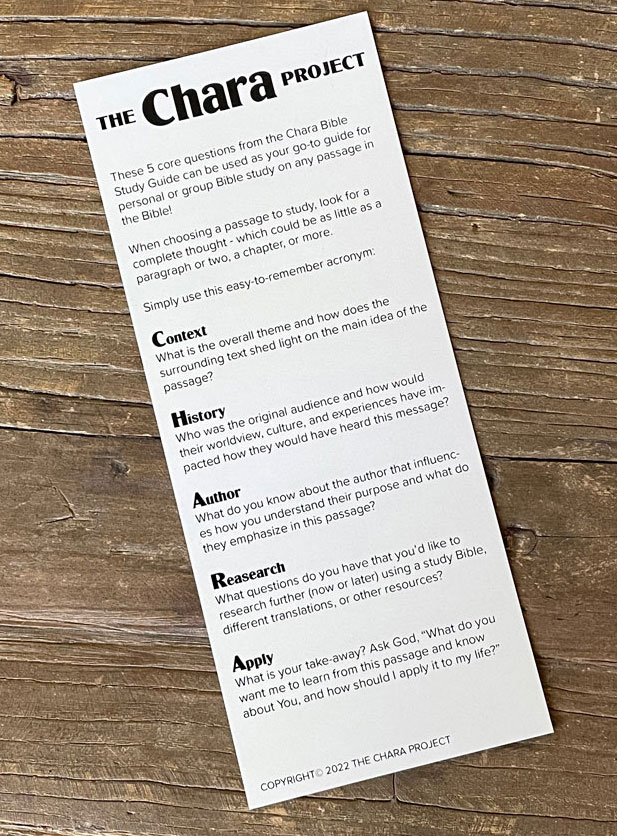“Slaves, in reverent fear of God submit yourselves to your masters, not only to those who are good and considerate, but also to those who are harsh..” (NIV)
Welcome to the Bible Study Guide for 1 Peter 2:18, which leverages questions from the CHARA Bible Study Guide when studying this verse. Below are the questions the Chara team chose to ask, in the order they chose to ask them, but feel free to use other questions or change up the order as you dive into this passage. For ANSWERS from the Chara team on these questions, check out the video below.
CONTEXT
Immediate: What is the theme or main idea found in the surrounding paragraph(s) and how does that help determine what the verse means? When you start with just one verse, such as 1 Peter 2:18, “Slaves, in reverent fear of God submit yourselves to your masters, not only to those who are good and considerate, but also to those who are harsh” (NIV), you’ll want to begin working your way out to read the surrounding context.
Start by reading the paragraph in 1 Peter 2:18-20. What is the main idea?
Now look beyond the paragraph to see if that theme is further developed. When we look for a complete thought, our context expands to include parts of two chapters. Read 1 Peter 2:11-3:7. What is the the main idea here?
AUTHOR
Patterns: What is highlighted through the use of repetition? What instruction is repeated at the beginning of each section (2:13, 2:18, 3:1)?
HISTORY
Who was it written to? Is anyone excluded? (Hint: List everyone that receives the instruction to submit). How are all these people described in 1 Peter 2:16?
RESEARCH
Translations: Does another Bible translation (or version) add perspective or clarity on what the original language was trying to communicate? Read 1 Peter 2:18 in several Bible translations. How else can “slave” be translated? And what perspective does that give?
Resources: What insights do you learn from Biblical scholars provided in Study Bibles, commentaries, and credible online resources on 1 Peter 2:18 and the topic of slaves in the Bible? Author, Dan Kimball, In his book, “How Not to Read the Bible”, explains that slavery today isn’t the same as slavery in the Bible. For starters, slavery was typically not race-based (Israelties had Israelite “servants”). Slaves could also be educated and hold jobs. In Israel, selling oneself as a slave was a common way for the poor to survive (Levivitcus 25:39). It meant their needs would be taken care of by their master and it allowed them to escape poverty or pay off debts. Hebrew slaves were limited to six years of service (Exodus 21:2) and they were not to be sent away empty handed (Deuteronomy 15:13).
CONTEXT
Bible: How does this fit into the big story of the Bible? Another important thing for us to remember is that God did not create slavery. Humanity created slavery. When Adam and Eve rebelled against God’s plan and chose their own way, sin and corruption entered the world (Genesis 3).
Read Genesis 1:27. How did God create all humanity? What do you learn about Christ followers in Galatians 3:28? How does this challenge you to treat others?
Bible: Does the text quote or allude to another passage in the Bible and what understanding does that give? According to Ephesians 6:9 and Colossians 4:1, how did God give protection and dignity to slaves? What reminder was given to the Master?
Immediate/Connective Words: How are connective words (e.g. so that, for) used to develop a complete thought? Unfortunately, some slaves were still treated harshly and unjust by their Master and yet, Peter instructed them to submit. Why? Start by reading 1 Peter 2:19-20, then read also 1 Peter 2:12, 15, 3:1-2 to learn why Peter instructed them to submit and live honorably.
Book: Is the theme repeated throughout the book and how does it fit within the overall purpose of the book? Throughout his letter, Peter repeats this concept of suffering for doing good. Read 1 Peter 2:20-25, 3:13-18, 4:12-19. As Christ followers, whose example should we follow and how should that affect our attitude about suffering?
HISTORY
Why was this message given to those people at that time? You’re probably catching on to the theme of suffering found throughout 1 Peter. This letter was written to early Christians that had left their homes due to persecution and were now scattered throughout Asia Minor (1 Peter 1:1). From what you’ve read so far (and we encourage you to read all 5 chapters), why do you suppose Peter wrote this letter? (Hint: see 1 Peter 5:12)
APPLY
Respond: What was expected of the original audience and what principles make sense for us now (is it a cultural or timeless truth)? On the subject of slavery, the Bible is more descriptive, than prescriptive. Meaning it describes what took place back then, not necessarily what should’ve taken place. God does not condone slavery and the Bible should not be misused to support it. God did however give guidance and protection to slaves and Masters within the social institution that existed in their day. That being said, is there a timeless principle that we can learn and apply to our lives today?
Ask: What do you learn about God – His character, attributes, or desires? (Hint: read 1 Peter 5:6-11)


